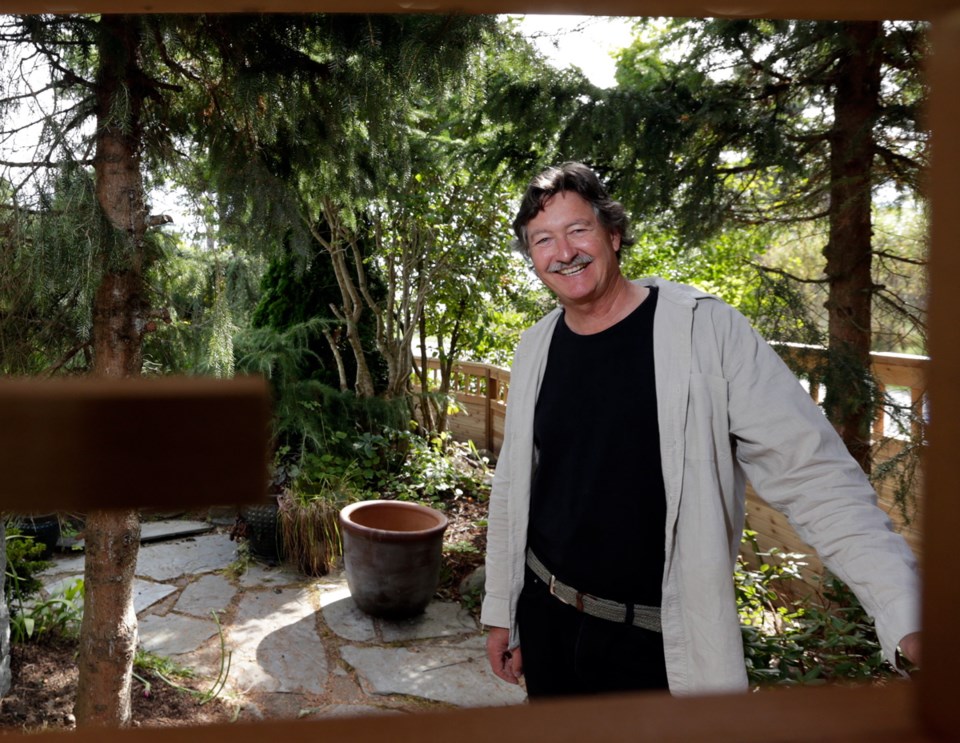One thing that spurred Victoria’s Michael Wuitchik to write his debut novel was meeting a young and beautiful amputee.
Wuitchik, a psychologist-turned-writer, first visited Sierra Leone 13 years ago. He met the amputee at a refugee camp in Freetown, the West African country’s capital. A pretty woman, about 19 years old, she was missing an arm and a leg. This victim of rebel forces had also been raped multiple times.
Wuitchik, there on a relief mission, met the woman’s unblinking eyes. It is something he’ll never forget.
“Her eyes were almost catatonic,” he said, chatting in the living room of his 10 Mile Point home, which is decorated with African masks. “What she had seen and experienced was ... almost beyond [belief].”
That encounter was a defining moment for the 61-year-old, whose 367-page novel about war-torn Sierra Leone, My Heart is Not My Own, has just been published by Penguin.
It is Wuitchik’s first novel — a notable achievement for someone whose previously published works were limited to scientific articles and newspaper features. My Heart is Not My Own is the story of Dr. John Rourke, a Vancouver doctor who once served as relief worker in West Africa. One day, a diary written by an African ex-lover, Mariama, mysteriously arrives in the mail. Reading it, Rourke feels compelled to return to a world of child soldiers, acts of horrendous violence and a people determined to not only survive, but live with heart and humanity.
The novel has a ring of authenticity, particularly in its descriptive passages, that reflects Wuitchik’s long history with Sierra Leone. He first visited in February of 2000 with CAUSE Canada. Wuitchik, the founder of the Canmore and Vancouver Pain Clinics, initially intended to see if it was safe to bring his staff to provide rehabilitation for wounded civilians.
It wasn’t safe at all. It was the tail end of Sierra Leone’s civil war. After seeing checkpoints manned by “drug-addled young men, all with AK-47s,” Wuitchik decided his Canadian staffers had better stay home.
At the time, he visited a camp for rebel child soldiers — aged 13, 14 and 15 — and their own children, some of them three and four years old. Wuitchik also visited the Murray Town camp for amputees, in which everyone was missing one, two or even three limbs.
That’s where he met the woman with the faraway eyes. Another important moment, Wuitchik says, was having his picture taken with a group of amputees. Studying the photograph later, he was struck by something.
“I think almost every one of them was smiling for the camera. I was absolutely stunned,” he said.
Wuitchik has been to Sierra Leone half a dozen times — typically doing humanitarian work (he and his wife will return in February). Working with family, friends and World Vision Canada, Wuitchik has helped build a library in the village of Sumbuya. He’s also paid for more than 70 girls’ school fees and funded instructors who need teaching certificates. And he’s gotten to know the people.
During one visit to Sierra Leone, in order to research his novel, he hired a driver and a vintage four-wheel-drive to take him across the country.
The theme of human resiliency in the face of terrible violence is a prevailing theme in My Heart is Not My Own. Somewhat ironically, the central character, Dr. John Rourke, nurses a post-traumatic stress disorder, despite the fact his experiences pale in comparison to those of the Africans.
Before retiring at age 50, Wuitchik worked 25 years as a psychologist based in Canmore. He’s especially interested in the stories of people who undergo trauma — something that helped in writing his novel. His professional experiences include conducting a doctoral dissertation study in which he asked 100 women about their thoughts during childbirth (these were recorded during the actual births).
Wuitchik always wanted to be a writer. Early on, he dreamed of becoming a foreign correspondent. He tried to write fiction as a practising psychologist, but found the demands of work and raising a family made it too difficult.
Now, buoyed the experience of having his debut novel accepted by a major publishing house, Wuitchik is plotting scenarios for new novels, including a psychological thriller.
The cinematic quality of My Heart is Not My Own suggests it might make a good film.
Wuitchik agrees.
“I think it would be a good film, too. I’m actually going to talk to my agent in Toronto next week. We’ll be talking about the possibility of pitching it.”
______
On Tuesday at 7:30 p.m. at Munro’s Books, Michael Wuitchik will do a signing for My Heart is Not My Own. He will be joined by Shelagh Plunkett, author of the memoir The Water Here is Never Blue.



